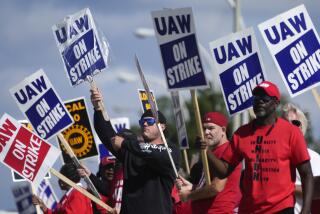Buyouts Move Into New, More Risky Territory
- Share via
You may think the current wave of multibillion-dollar takeovers has gone as far as it can go. But, truth is, you’re likely to see a lot more big-deal buyouts.
For what the $20-billion bid for RJR Nabisco and the $14-billion tussle between Philip Morris and Kraft represent is a historic shift in ownership and control of American industry. Company managements and Wall Street investment bankers are offering big bonuses to stockholders in a bid to buy or maintain control of corporations.
Whether their buyouts ultimately will be good or bad for U.S. industry is unclear even to financial experts. But more deals seem sure. And some of them will involve a lot of foreign money--with all the prospects for political backlash that entails.
But we must understand the present before speculating about the future. And the key to understanding what’s going on today lies in the zooming stock prices of takeover candidates. Why is it that a company can sell on the market for one price one day and shoot up the next because somebody wants to buy the whole corporation?
RJR Nabisco, for instance, was selling at $56 a share when its management suggested a buyout at $75, provoking an offer of $90 a share from Kohlberg Kravis Roberts, the leveraged buyout firm.
Reason for Premiums
Kraft was selling at $59.50 a share before Philip Morris offered $90, whereupon Kraft’s management came up with a special dividend for shareholders that it said was worth $110 a share.
In Green Bay, Wis., meanwhile, the management of Ft. Howard Corp.--a 70-year-old supplier of paper products to business and restaurant washrooms--and the investment bankers Morgan Stanley paid $53 a share for stock that was selling for less than $40.
Why the premiums? Why is the buyout value higher than the everyday market value?
The answer is control. The ownership of assets and the right to decide their disposition has a value, says Dean LeBaron of Boston’s Batterymarch investment company. “Control gives you the right to take money out of an overfunded pension fund, to borrow money or to reallocate assets--theoretically for more productive purposes.” Corporate managements can already do many of those things, but only with shareholders watching nervously.
Bluntly put, control gives a buyer the combination to the company safe.
Most stock market investors, the big institutions as well as individual, don’t care about control. They are passive investors, wanting dividends and rising stock prices. Often they don’t even bother to send in the votes their shares entitle them to.
Repeated Pattern
But now, says LeBaron, those who understand the value of control are buying out the passive stockholders with the proceeds of high-interest bonds issued to other investors. They are left with total control of the company.
It’s a pattern that will be repeated. Foreigners in particular appreciate the value of voting stock and control. In their countries you cannot buy control; a corporation’s shares typically are held by companies having a business relationship with the firm, and by banks--which ultimately are backed by governments. Most of Japan’s major companies and many of Europe’s too are owned in such relationships--an environment said to encourage long-term investment, in contrast to the impatience of U.S. shareholders looking for quick profits.
One hope in the current buyouts is that they will give U.S. industry more stable ownership. Investment banking firms already hold sizable stakes in major companies--Morgan Stanley in Burlington Industries, and now Ft. Howard paper; Shearson Lehman, itself an arm of the giant American Express Co., is attempting to take a big stake in RJR Nabisco. Those and other Wall Street firms say their buyout activities will help U.S. industrial renewal.
But skepticism is widespread. Prof. William Ouchi of UCLA, who has long argued that U.S. companies need more supportive stockholders, suspects investment bankers are driven by the lure of fee income. And Charles Rose, an analyst at Oppenheimer & Co. who has written on the new buyout patterns, sees Wall Street owners more adept at milking businesses than expanding them.
The fact that Morgan Stanley and other financiers are taking more than $100 million in fees from the Ft. Howard buyout supports the skeptics.
The upshot? Either these buyouts work as advertised to aid U.S. business, or catastrophe lies ahead. The current takeover wave is accompanied by a massive buildup of U.S. corporate debt, which could make the next recession a true disaster, with the failure of some of the nation’s biggest companies. In the painful aftermath, as in the 1930s, there would be reform of Wall Street and business practice.
As the size of today’s deals is unprecedented, so could be the consequences.
More to Read
Inside the business of entertainment
The Wide Shot brings you news, analysis and insights on everything from streaming wars to production — and what it all means for the future.
You may occasionally receive promotional content from the Los Angeles Times.










